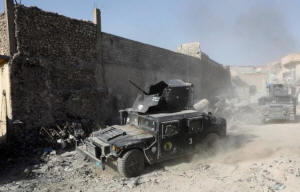|
Civilians flee as Iraqi forces attack
last Islamic State redoubt in Mosul
 Send a link to a friend
Send a link to a friend
 [June 30, 2017]
By Stephen Kalin [June 30, 2017]
By Stephen Kalin
MOSUL, Iraq (Reuters) - Iraqi government
forces attacked Islamic State's remaining redoubt in Mosul's Old City on
Friday, a day after formally declaring the end of the insurgents'
self-declared caliphate and the capture of the historic mosque which
symbolized their power.
Dozens of civilians fled in the direction of the Iraqi forces, mostly
women and children, some wounded by insurgents fire, thirsty and tired.
The battles ahead will be difficult as most of the militants are
foreigners expected to fight until the death. They are dug in among
civilians, using them as human shields, Counter Terrorism Service (CTS)
commanders in the city told Reuters.
CTS Major General Maan al-Saadi said it could take four to five days of
fighting to capture the insurgents' redoubt by the Tigris River,
defended by about 200 fighters,
"The advance continues to Midan neighborhood," he said. "Controlling it
means we have reached the Tigris River."

The insurgent position is several hundred meters wide and tens of
thousands of civilians are trapped there in harrowing conditions, with
little food, water, medicine and no access to health services, according
to those who managed to flee.
Those who escaped on Friday streamed through alleyways near the Grand
al-Nuri Mosque, which Islamic State fighters blew up a week ago.
Plumes of smoke billowed over the riverside districts amid artillery
blasts and burst of gunfire. Western troops from the U.S.-led coalition
were helping adjust artillery fire with air surveillance, he said.
Iraqi Prime Minister Hailer al-Abadi declared the end of Islamic States'
caliphate -- which he called "a state of falsehoood"' -- on Thursday
after CTS captured the ground of the ruined 850-year-old mosque.
It was from the mosque's pulpit that Islamic State leader Abu Bakr
al-Baghdadi declared his caliphate over parts of Syria and Iraq almost
three years ago to the day.
The insurgents chose to blow it up rather than see their black flag
taken down from its al-Hadba, or Hunchback, minaret where it had been
flying since June 2014.

[to top of second column] |

Armoured fighting vehicles of the Counter Terrorism Service maneuver
at the positions of the Iraqi forces near the Grand al-Nuri Mosque
at the Old City in Mosul, Iraq June 29, 2017. REUTERS/Erik De Castro

GRINDING WARFARE
The symbolic victory of the Iraqi forces was won after more than
eight months of grinding urban warfare which displaced 900,000
people, about half the city's pre-war population, and killed
thousands of civilians, according to aid organizations.
A U.S.-led international coalition is providing air and ground
support to the offensive, which army and federal police units are
also taking part in, attacking from different directions.
The fall of Mosul would in effect mark the end of the Iraqi half of
the IS caliphate, although the group still controls territory west
and south of the city, ruling over hundreds of thousands of people.
Its stronghold in Syria, Raqqa, is also under siege..
The group continues to occupy an area as big as Belgium across Iraq
and Syria, according to IHS Markit, an analytics firm.
Al-Baghdadi's speech from the Grand al-Nuri Mosque on July 4, 2014,
was the first and only time he has revealed himself to the world.
He has left the fighting in Mosul to local commanders and is
believed to be hiding in the border area between Iraq and Syria,
according to U.S. and Iraqi military sources.

The group has moved its remaining command and control structures to
Mayadin, in eastern Syria, U.S. intelligence sources said last week,
without indicating if Baghdadi was also hiding in the same area.
The secretive Islamic State leader has frequently been
reported killed or wounded. Russia said on June 17 its forces might
have killed him in an air strike in Syria. But Washington says it
has no information to corroborate such reports and Iraqi officials
have also been skeptical.
(Writing by Maher Chmaytelli; Editing by Angus MacSwan)
[© 2017 Thomson Reuters. All rights
reserved.]
Copyright 2017 Reuters. All rights reserved. This material may not be published,
broadcast, rewritten or redistributed. |